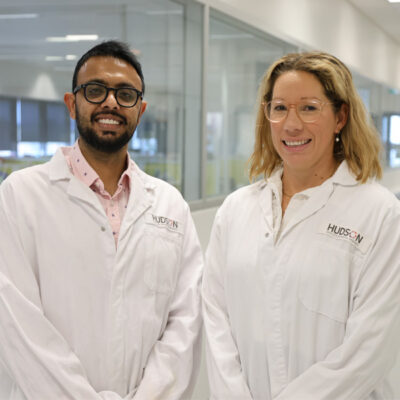Cerebral Palsy Alliance grant success
By Hudson Institute communications
Two Hudson Institute researchers have been awarded a share of almost $165 000 in funding from the Cerebral Palsy Alliance.
Dr Vanesa Stojanovska and Dr Anne Trinh were awarded the funds from the Cerebral Palsy Alliance’s Research Foundation Emerging Research Grants.
Dr Stojanovska’s research is investigating whether a common anti-inflammatory, ibuprofen can reduce inflammation in the womb and prevent the need for respiratory support when babies are born, which can injure their brains and lead to conditions like cerebral palsy.
Dr Anne Trinh’s project aims to develop the first adult guidelines for osteoporosis in cerebral palsy to help individuals maintain mobility for as long as possible by preserving their bone health.
The Research Foundation of Cerebral Palsy Alliance grant funds the world’s best and brightest researchers to find ways to improve current interventions and ultimately find a prevention and cure for cerebral palsy.

Anti-inflammatory protection of brain stem respiratory centres to help preterm babies breathe at birth
Dr Vanesa Stojanovska
Up to 92 per cent of preterm babies struggle to breathe at birth and require respiratory support to survive. While life-saving, this respiratory support injures their immature brains leading to life-long consequences including cerebral palsy. In addition, 40 to 70 per cent of preterm babies are exposed to infection and inflammation in the womb, and this further increases the requirement for respiratory support and increases the risk and severity of perinatal brain injury.
While research to date has focused on improving respiratory support techniques, a major issue has been overlooked. That is, understanding why these babies cannot breathe in the first place.
The brainstem is a life-sustaining brain region containing several ‘respiratory centres’ vital for breathing. These respiratory centres generate and modulate our respiratory rhythm, change breathing patterns based on oxygen and carbon dioxide levels; and control the muscles necessary for respiratory function and for maintaining an open airway. Despite the critical importance of the brainstem in controlling breathing, it has largely been ignored as a cause or contributor to breathing difficulties. This research project focuses on this critical aspect of breathing.
The team’s research has shown that inflammation in the womb stops fetal breathing. Importantly, when fetal breathing stops, this correlates with inflammation in the brainstem and particularly with the inflammatory molecule prostaglandin E2 (PGE2). It is thought that inhibition of fetal breathing by PGE2 may result in breathing difficulties at birth, and thus increase the requirement for respiratory support which is known to increase the risk of brain injury.
In a major breakthrough, the team’s research has shown that reducing inflammation and PGE2 levels in the brain stem using the anti-inflammatory drug ibuprofen restores fetal breathing.
Ultimately, the team aims to demonstrate that targeting PGE2 during fetal life will reduce the need for respiratory support at birth and minimise brain injury in preterm babies.

Optimising osteoporosis care in Cerebral Palsy: Developing a pathway for adolescents and adults
Dr Anne Trinh
Up to half of adults with cerebral palsy (CP) will develop thin bones (osteoporosis) and broken bones which can severely decrease mobility and quality of life. Concerningly, up to three quarters of adults with CP will lose their ability to mobilise and many will need assistive devices. Therefore, preserving bone health in adults with CP is key to maintaining independence, but there are no guidelines for doctors and caregivers.
The project aims to provide the first adult guidelines for osteoporosis in CP. There will be a specific focus on how best to transition care from child to adult services to ensure bone health is maintained. To develop these guidelines, what is already known about osteoporosis in adults with CP will be reviewed and summarised.
A team of experts will trial this information to develop recommendations on
- Which adults with CP should be screened for osteoporosis
- How to diagnose osteoporosis in adults with CP
- Management strategies for osteoporosis in CP.
A consensus between the experts will be obtained and then the recommendations will be open for public review. The team aim to have the guidelines published and disseminated within two years. The guidelines will include
- A practical summary and algorithm to inform clinical practice
- A review of published literature examining the evidence for diagnosing and treating osteoporosis in CP
- Practical tools and documents for clinicians using the pathway
- A lay description of the summary for consumers with CP and their caregivers.
The project will increase awareness among doctors, consumers with CP and caregivers so that bone health is examined as part of routine care.
About Hudson Institute
Hudson Institute’ s research programs deliver in three areas of medical need – inflammation, cancer, women’s and newborn health. More
Hudson News
Get the inside view on discoveries and patient stories
“Thank you Hudson Institute researchers. Your work brings such hope to all women with ovarian cancer knowing that potentially women in the future won't have to go through what we have!”






